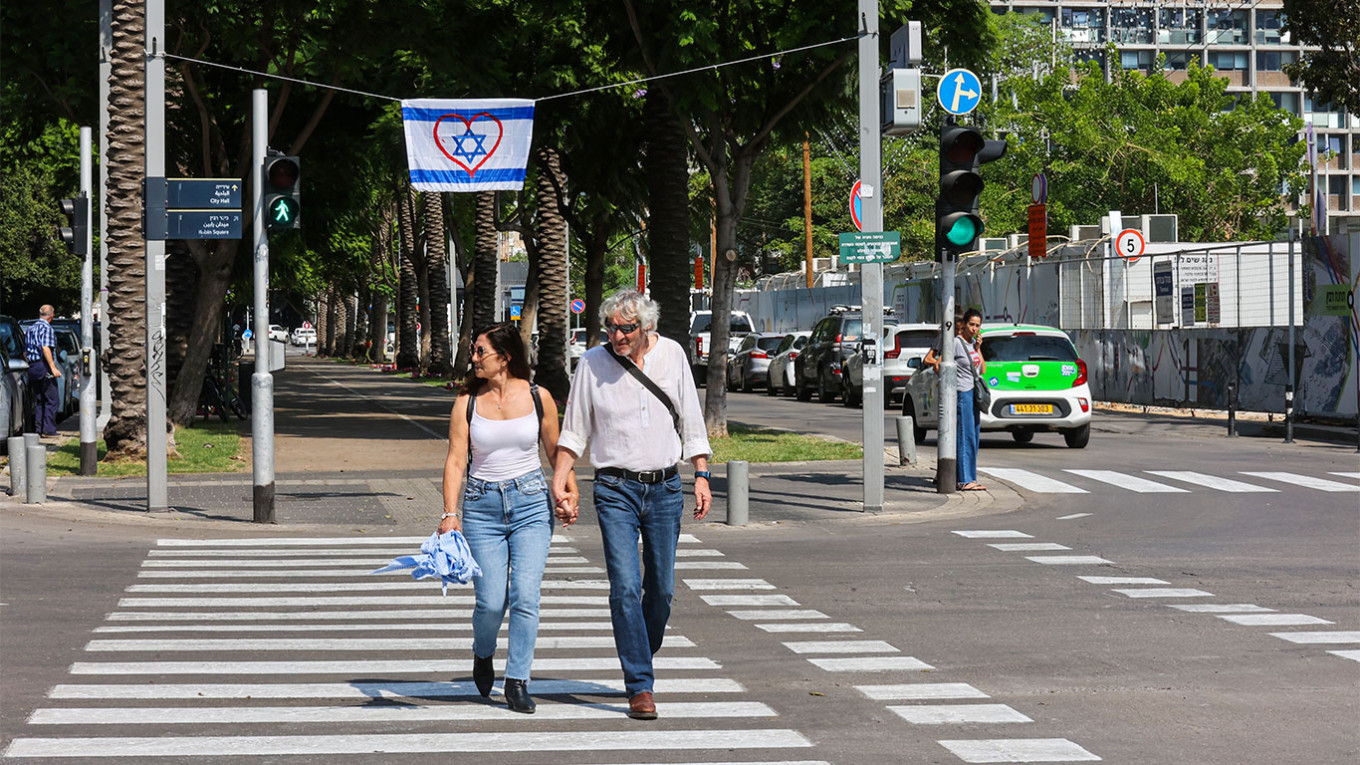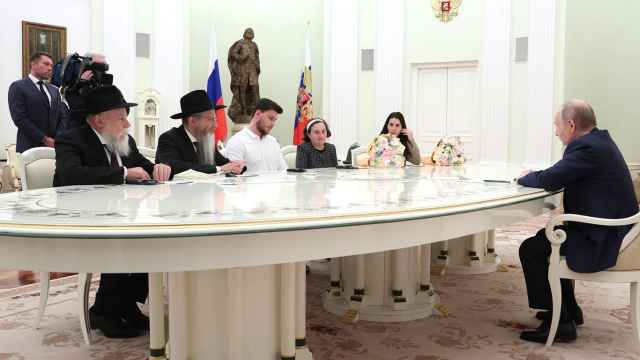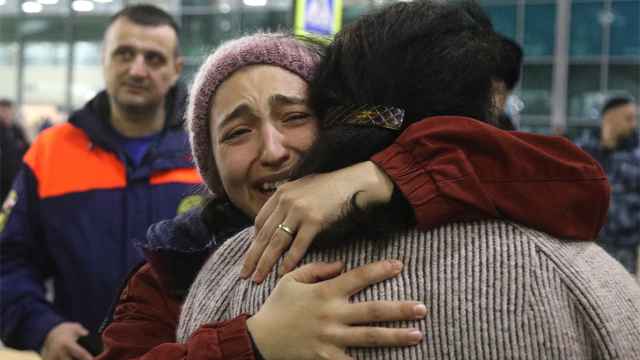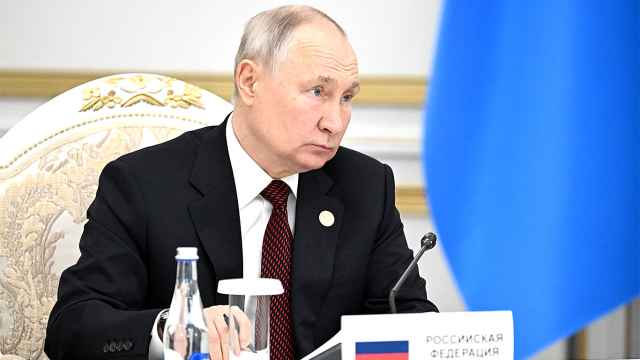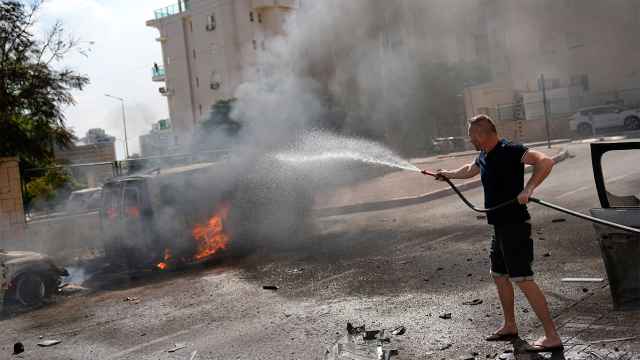Russian emigre Anna could hear explosions from her apartment in Beersheba, a city in southern Israel not far from the Gaza Strip that was hit by rocket fire as the Hamas militant group launched its surprise attack on the country.
“In Russia, I wasn’t afraid of shelling. I was afraid of my own government,” said Anna, who asked to go by just her first name in order to speak freely. “When I moved to Israel, I knew that rockets could fly at us, but I’m sure the government here can protect me.”
Since Moscow’s invasion of Ukraine, Israel has been a hub for thousands of Russians seeking to evade political persecution, economic crisis or being sent to fight in the war.
For these emigres, the most recent outbreak of hostilities in the decades-long conflict between Israel and Palestine has come as a shock. Yet several Russians who spoke to The Moscow Times said that it has not shaken their resolve to resettle in Israel.
“It may seem strange, but now, when I sit in my apartment in Beersheba, waiting out the shelling, I feel less afraid than when I went to anti-war rallies in Moscow,” Anna said.
Hamas militants stormed into southern Israel early Saturday, unleashing a bloody assault in which over 1,200 people were killed and dozens more taken hostage. In retaliation, Israel has bombarded Gaza and cut off its supplies of electricity, fuel, water and food, compounding the misery of the conflict.
The fighting has so far claimed 2,400 lives on both sides, with thousands more injured. International aid groups warn that the death toll could rise dramatically as Israel continues to lay siege to Gaza, one of the most crowded places on Earth and from where few have hope of escaping.
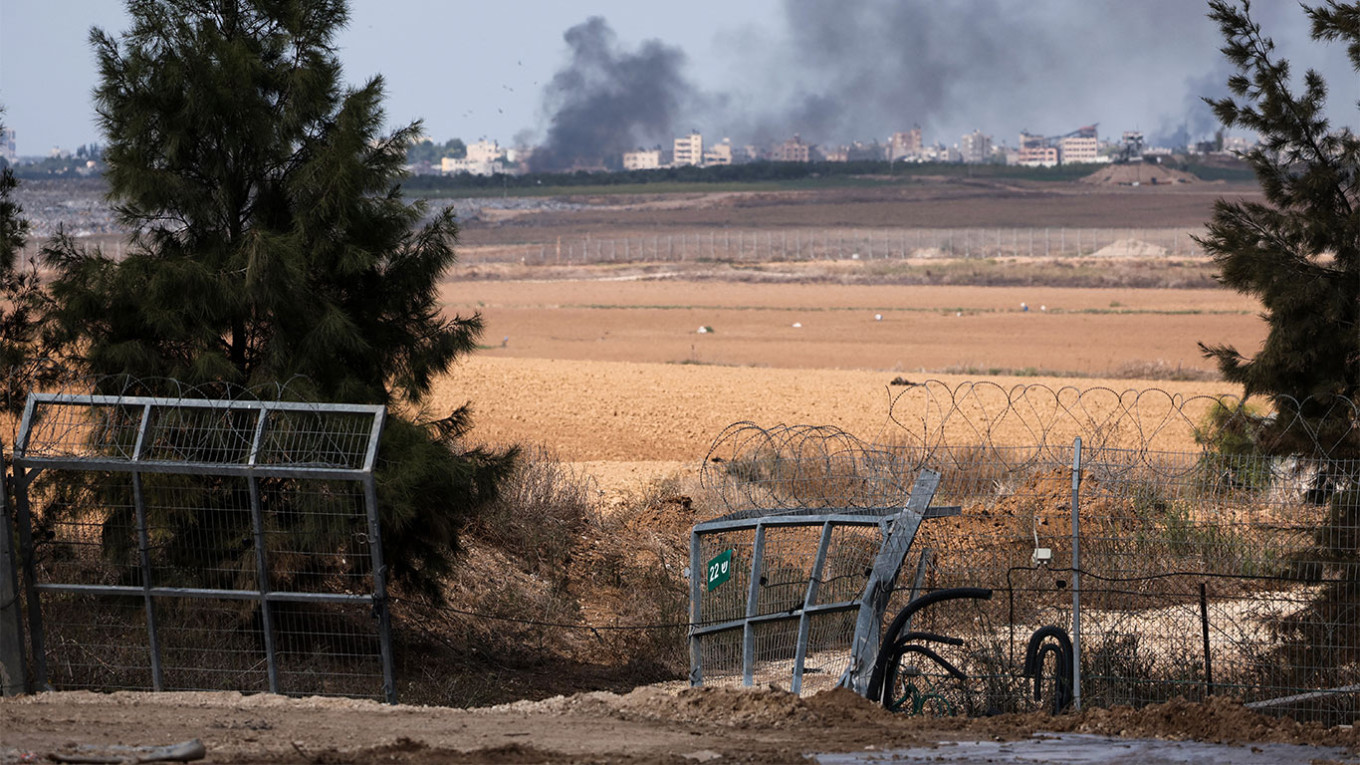
A Russian anti-war activist who fled to Israel from Moscow last year said that despite Hamas’ stunning attack over the weekend, she still feels “calmer in Israel than in Moscow.”
“I understood that there was unrest in Israel,” she told The Moscow Times on condition of anonymity due to concerns about the safety of her family living in Russia.
“But I felt that having some Hamas terrorists occasionally firing missiles at us, or even lone terrorists infiltrating Israel with knives or firearms sometimes, is still better than staying in Putin's terrorist state.”
“We'll get through this, there's hope,” she said.
Some Russian emigres have taken part in volunteer efforts to help Israelis impacted by the war, including donating blood and fundraising, while others have simply tried to offer moral support.
Irina Ostropolskaya, a retiree from Moscow who recently moved to Israel, on Tuesday attended the funeral of Vadim Blikh, a Ukrainian-born Israeli soldier who was killed while fighting Hamas militants near the Gaza Strip.
“I'm a person of action, I have to do something, whether it's rescue or [supporting people during] war,” she said, explaining her decision to attend.
At the funeral, Blikh’s “mother screamed: ‘I don't want this kind of fame’,” Irina said.
“It's very hard. I was walking home and crying.”
Israel has received a record number of Russian repatriates since Moscow’s invasion of Ukraine. According to the Israeli interior ministry, 50,900 Russians obtained citizenship between Feb. 24, 2022 and Feb. 23, 2023.
In the wake of Saturday’s attack by Hamas militants, prominent pro-Kremlin figures have mocked Russians who moved to Israel because they did not want to be called up to fight or live in a country that is “at war with a neighbor.”
“The country that is not at war with its neighbors is again at war with its neighbors. We await the exodus of Russian pacifists [from Israel]," wrote Margarita Simonyan, editor-in-chief of the state-funded RT broadcaster.
Pro-war writer Zakhar Prilepin joked that he was "worried" about the anti-war comedian Maxim Galkin, who fled to Israel last year, claiming that he might be dragged into the Israeli army after the country launched a mobilization of some 360,000 reservists to fight against Hamas.
Russian emigres who have been called up for their mandatory military service in the Israeli Defense Force after relocating to the country declined to speak to The Moscow Times due to military censorship.
Although many Russians have not enlisted in the Israeli army and are not subject to the government’s mobilization order, some of those who spoke to The Moscow Times said that they would agree to serve in the military if summoned.
“If I had been drafted, I would have gone. I'm not afraid of that,” said 31-year-old Mihail, who moved to northern Israel from Moscow.
“I served in the Russian army, and if I had been called to defend my country in Russia — not to attack someone else's — I would not have left Russia,” he added.
Mihail Alexandrov, another repatriate living in the city of Netanya, said he would also follow conscription orders if he was called up.
“I think that here everyone understands what they’re fighting for — for the mere existence of Israel. And what the Russian army fights for now — I don’t think anyone has a clear answer,” he said.
As of Tuesday afternoon, the Russian Embassy in Tel Aviv has confirmed the deaths of four Russian citizens and said at least six more remain missing as a result of the Hamas attack.
Still, Moscow has refrained from explicitly supporting or opposing either of the warring sides, instead calling on them to reach a ceasefire and show restraint.
President Vladimir Putin, who over the years has developed a personal chemistry with Israel’s Prime Minister Benjamin Netanyahu, did not publicly comment on the war until Tuesday, when he placed blame for the conflict on Washington’s foreign policy failures.
Meanwhile, Russia’s Chief Rabbi Berel Lazar said that "all decent people, regardless of origin and religion," feel pain and indignation toward the scenes from Israel.
“We ask God to strengthen the hand of an Israeli soldier so that every shot at the terrorists hits its target exactly,” he said.
Although many Israelis sympathize with Palestinians, the brutality of the Hamas attack has for the moment silenced these voices, with Israeli society rallying around the cause of defeating the militant group, said political scientist Michael Pellivert, a Russian repatriate living in Israel since 1997 who served as First Secretary of the Israeli Embassy in Russia from 2010-2013.
“It must be admitted that now, on the sixth day of the war, the main emotion experienced by the majority of Israeli residents is the desire for revenge," Pellivert told The Moscow Times.
But he also pointed to a political divide between recent immigrants and those who have lived in Israel for many years.
“Those who came to Israel after the start of the war in Ukraine, in my opinion, take more moderate positions, more left-wing positions in relation to Palestine,” he said. “They believe that the Israeli army should be less violent and should take humanitarian concerns into account.”
For some of the Russians who spoke to The Moscow Times, the Hamas attack reminded them of the atrocities witnessed against Ukrainians during Russia’s invasion of its neighbor.
“For all of these two days, waiting out the shelling, I thought a lot about the experience of Ukrainians,” said Anna from Beersheba.
“Of course, it's not comparably safer here. I know that if I wake up from the air raid siren, I need to run for cover. I can't imagine how you can live in these conditions for months and what to do if there is nowhere to run.”
She also compared the victims in Gaza with the Ukrainian civilians who have been inadvertently killed as a result of the Ukrainian army’s defense efforts.
“In the end, the side that started the war is to blame for all these deaths,” Anna said.
Among the Russian newcomers, “almost everyone agrees that Hamas must be destroyed,” said Dmitry, a 52-year-old repatriate who also declined to share his last name. “Unfortunately, it’s not very clear how to do this without destruction in Gaza, which will inevitably lead to civilian deaths.”
“It’s sad that all this provokes a new series of violence, which in turn will lead to even more violence.”
Pyotr Kozlov contributed reporting to this article.
A Message from The Moscow Times:
Dear readers,
We are facing unprecedented challenges. Russia's Prosecutor General's Office has designated The Moscow Times as an "undesirable" organization, criminalizing our work and putting our staff at risk of prosecution. This follows our earlier unjust labeling as a "foreign agent."
These actions are direct attempts to silence independent journalism in Russia. The authorities claim our work "discredits the decisions of the Russian leadership." We see things differently: we strive to provide accurate, unbiased reporting on Russia.
We, the journalists of The Moscow Times, refuse to be silenced. But to continue our work, we need your help.
Your support, no matter how small, makes a world of difference. If you can, please support us monthly starting from just $2. It's quick to set up, and every contribution makes a significant impact.
By supporting The Moscow Times, you're defending open, independent journalism in the face of repression. Thank you for standing with us.
Remind me later.


